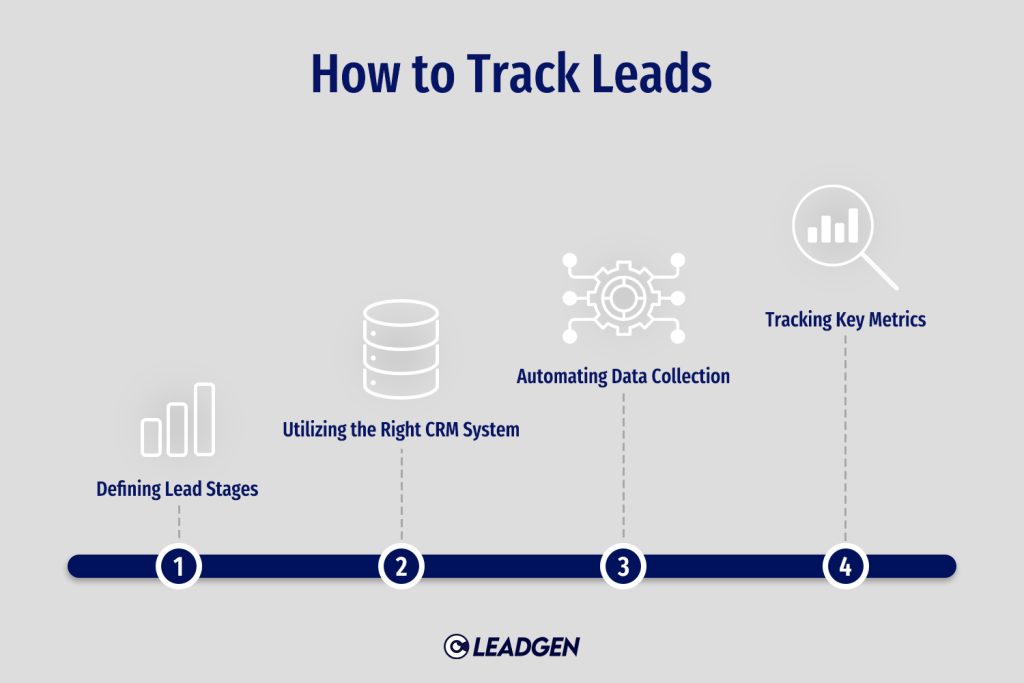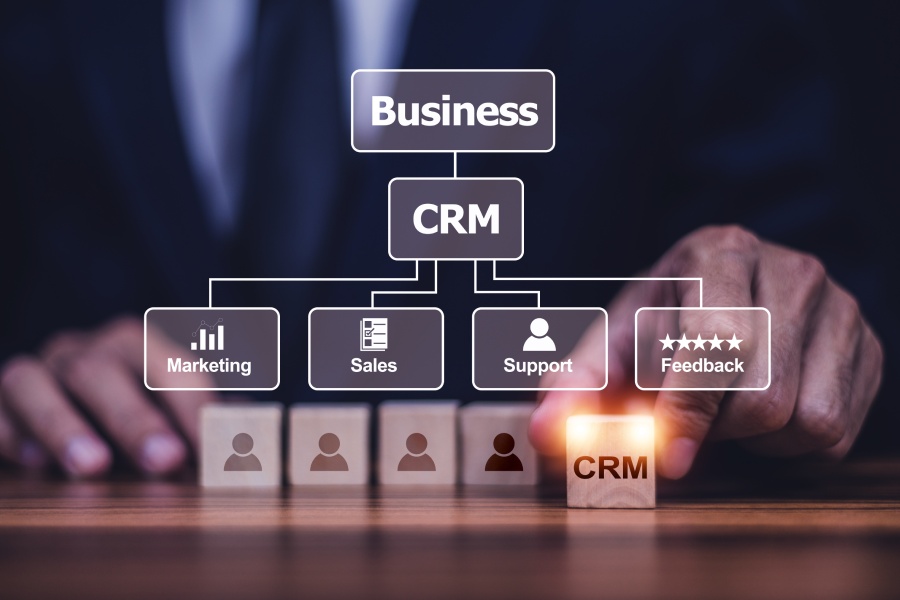Lead tracking is a strategic process essential for business owners, marketing professionals, and startups alike who seek a significant boost in their sales efforts. While attracting high volumes of leads is beneficial, you want to make sure you’re converting as many leads as possible. Through lead tracking, you can achieve this. But how to track leads and what metrics should you follow?
In this article, we’ve outlined each step in tracking leads from social media and how implementing a robust lead tracking system will help you optimize your marketing strategies and sales processes for maximum effectiveness. Discover the underlying benefits of lead tracking and learn more about the essential tools you need for success!

How to Track Leads
To clarify, lead tracking is the process through which marketers observe their leads across their full customer journey, revealing data on exactly how new leads become loyal customers. It gives you the valuable insights you need for success.
With lead tracking, you can understand the effectiveness of your marketing efforts in driving new leads and pipeline generation. It shows you what works when converting leads and where potential customers are dropping off, helping you refine your strategy and increase your conversion and retention rates. Ultimately, this simple method will determine which channels are driving the best results and, therefore, are worth investing in. But how to track sales leads?
To effectively track leads, you need to follow several key steps including:
- Defining lead stages
- Utilizing the right software or CRM system
- Automating data collection
- Tracking key metrics
Below, we’ll elaborate on each step, explaining in detail how you can leverage the full power of lead tracking!
1. Define your lead stages
To establish a robust lead tracking system, you need to define your lead stages. These are set to indicate where a person is in the buyer journey. While leads for B2B and B2C businesses may differ, there is a fundamental framework that applies to all. This framework typically includes six lead stages that most businesses can agree upon:
- Contact
- Lead
- Prospect
- Opportunity
- Custom stages
- Customer
Tracking begins as soon as marketers acquire a name, marking the entry of a lead into the sales funnel. Establishing clear definitions for each stage of the funnel is essential for setting up a lead tracking system that aligns with your sales process.
2. Choose the right software or CRM system
Lead data is at the core of lead tracking. Choosing the right management software or CRM (customer relationship management) system for lead tracking is vital for managing customer communication. As your sales teams work on improving your conversion rates, it’s important to keep things as organized as possible to ensure that you don’t miss out on any opportunities.
With a good CRM system or software in place, you can seamlessly store vital information on leads in an easy-to-navigate platform. This enables all teams to easily access up-to-date information for accurate and timely follow-ups through individual leads’ preferred communication channels and with personalization when applicable.
In addition, you can connect Google Analytics with your CRM to better understand your customer behavior, target audience, and overall performance.

3. Automate lead data collection
Relying on manual data entry for spreadsheets is both inefficient and prone to error. To achieve accurate, accessible, and instant lead information, implement automation tools in your lead tracking process. Automation not only smooths out your workflow but also enhances data accuracy and facilitates easier analysis. Utilize these tools to optimize the collection and organization of your lead data.
With an automated lead data collection system in place, you can also implement lead scoring and rank leads based on their likelihood to convert. By segmenting your leads with detailed insights, you can tailor your marketing efforts based on where leads are in the sales funnel and drive better results. This enables you to focus on high-quality leads and improve your overall conversion rates and revenue.
4. Analyze and improve
The final step in lead tracking is analysis and improvement. This crucial process allows you to continuously refine your lead management system, enhance customer experience, boost conversion rates, and increase revenue. Regularly review and optimize your database to maintain the accuracy and effectiveness of your lead tracking system.
Key Lead Tracking Metrics
Understanding each metric and how it provides valuable insights into lead generation and conversion performance is vital for improving your marketing and sales performance. Here’s a breakdown of the most essential metrics to monitor:
- Lead source – Tracks the sources of potential customers to optimize marketing strategies. When you know where your customers originate from – whether through organic reach, social media, or referrals – you can find out which channels are most effective and allocate your resources to high-performing channels.
- Conversion rate – Measures the percentage of leads that have converted into valuable customers. With it, you can evaluate the effectiveness of your sales process and identify areas for improvement.
- Lead value and quality – Assess each lead’s potential value and fit with your ideal customer profile. High-quality leads are more likely to convert and generate higher revenue for your business. Evaluating this metric helps prioritize efforts and tailor your approach to the most promising prospects.
- Inbound response time – Monitor the average response time to inbound requests and the percentage of these requests that result in successful outcomes. Faster response times are associated with higher conversion rates and improved customer satisfaction.
- Bounce rate – Measures the percentage of leads who visit your site but leave without engaging further. This metric is especially helpful when refining your landing pages and content to better capture and retain interest.
What Benefits Does Tracking Leads Provide?
As discussed above, tracking leads is a key element of the lead management process. But what are some of the most notable benefits it provides for your business?
In the following, we’ll explain how lead tracking can give you an advantageous edge in today’s dynamic landscape!
Boosting your marketing ROI
Implementing a lead tracking system can reveal which marketing channels – whether social media, website content, or email campaigns – generate the most quality leads for your business. This insight allows you to allocate your resources to the most effective efforts, ensuring your budget is spent efficiently.

Enhancing sales efficiency
By analyzing data from lead tracking, your sales team can focus on the most promising leads, maximizing their efficiency and increasing conversion rates. It helps prioritize high-value leads, improving overall sales productivity.
Supporting data-driven decisions
Lead tracking is an incredible tool that provides real data. With it, you gain valuable data on which demographics are most interested, how long it typically takes leads to convert, and what type of content resonates best with your audience. This information helps refine your strategies and craft more effective campaigns based on what truly works.
Essential Tools for Tracking Leads
Lead tracking tools are invaluable resources that provide a comprehensive picture of lead behavior, allowing you to optimize your sales and marketing methods for maximum impact. They go beyond simple contact information, delving into the psyche of your leads with insights into preferences, interests, and interactions across various channels.
However, it’s important to remember that when choosing such tools, you must consider your business needs by evaluating features like CRM functionality, integration options, and automation capabilities. The ideal lead tracking tool should align with your sales marketing goals and budget. With that said, ahead, we’ll explore three of our favorites:
Salesforce
Salesforce is a top-tier CRM platform renowned for its robust lead tracking, sales automation, and analytics features. With an AI-powered assistant, customizable dashboards, and detailed reporting, it provides in-depth reports to assess lead performance and sales metrics, making it ideal for businesses seeking comprehensive solutions.
HubSpot
HubSpot is an all-in-one CRM platform that excels at lead tracking and management. It offers remarkable reporting capabilities and campaign performance data, making it well-suited for any size business.
Zoho CRM
Zoho CRM is a versatile, cost-effective lead tracking platform that offers comprehensive management and automation features like lead capturing, scoring, and nurturing tools. With its in-depth reporting and a high degree of customization, Zoho is perfect for anyone seeking a flexible CRM that adapts to their specific needs.
Data Privacy Regulations
Adhering to data privacy regulations such as the General Data Protection Regulation (GDPR) and the California Consumer Privacy Act (CCPA) is not just crucial for maintaining customer trust but also for avoiding significant legal penalties. This is the final yet essential factor to ensure your lead tracking practices are both comprehensive and compliant.
You must obtain explicit consent from your leads before collecting or processing personal data. Clearly communicate your data privacy policies to your leads, informing them about what data will be collected, how it will be used, and who will have access to it. Ensure your lead tracking systems and tools you use have robust security measures in place.
Conclusion
In conclusion, effective lead tracking can be a game-changer for any business looking to optimize sales and marketing efforts. To fully leverage its potential, it’s essential to understand how to track leads from social media, how to track leads in Google Analytics, and which key metrics will maximize the impact of your future marketing campaigns. By implementing the strategies mentioned above, you can drive better results and position your business for sustained growth and success.
Tracking leads effectively can be challenging, but we’re here to simplify and streamline the process for your business. We at CLICKVISION Lead Gen are committed to connecting you with high-quality leads who are actively searching for services or products like yours.
Contact us today and let us help you unlock your path to success!

Dimitar is a seasoned marketing specialist and the visionary behind CLICKVISION. With over 10 years in digital marketing, he excels in crafting marketing strategies that boost rankings, which in return increase leads, conversions, sales, profits, and ROI.
